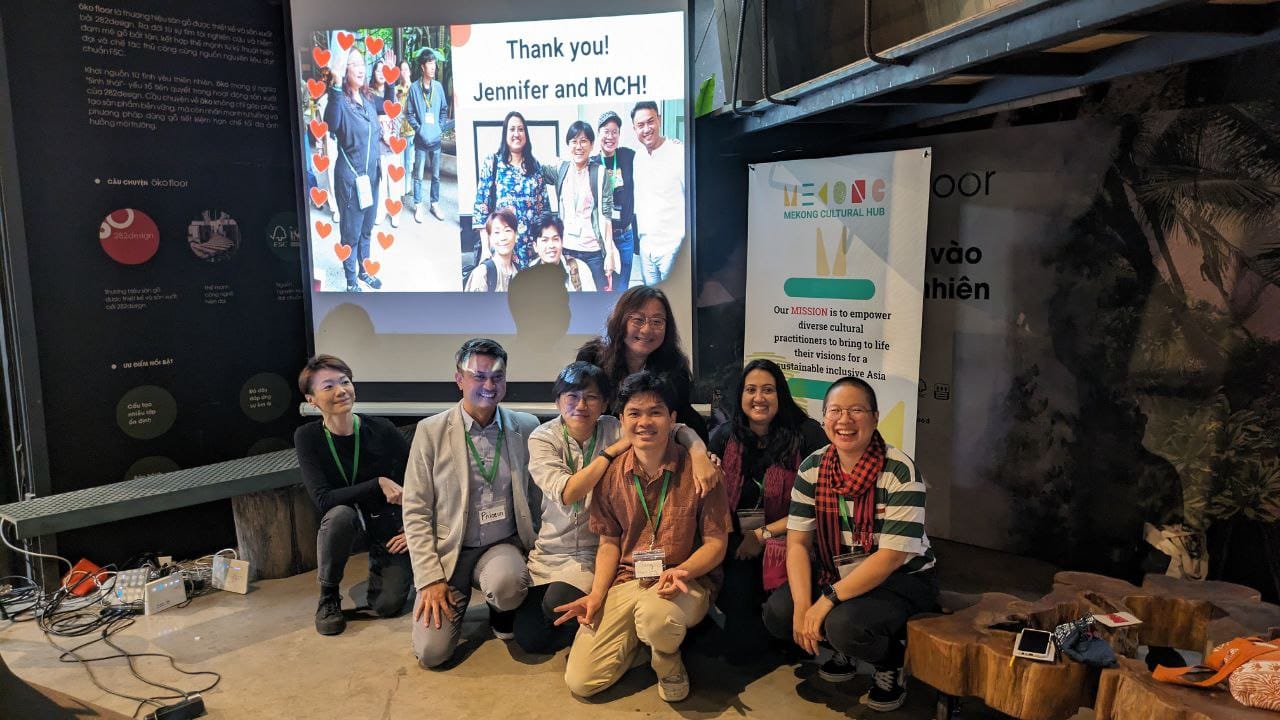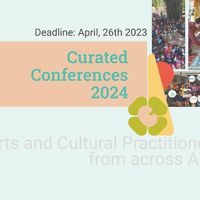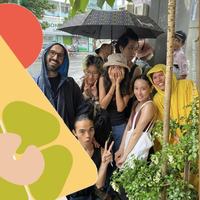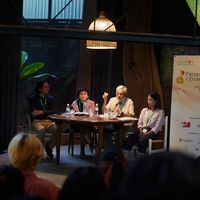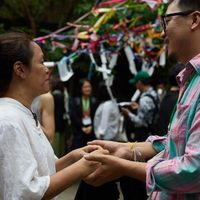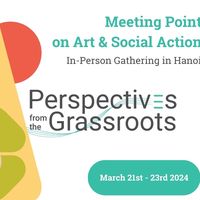Reflection on the curated conference theme, “Life Cycles of Grassroots Arts Organisations in Asia”
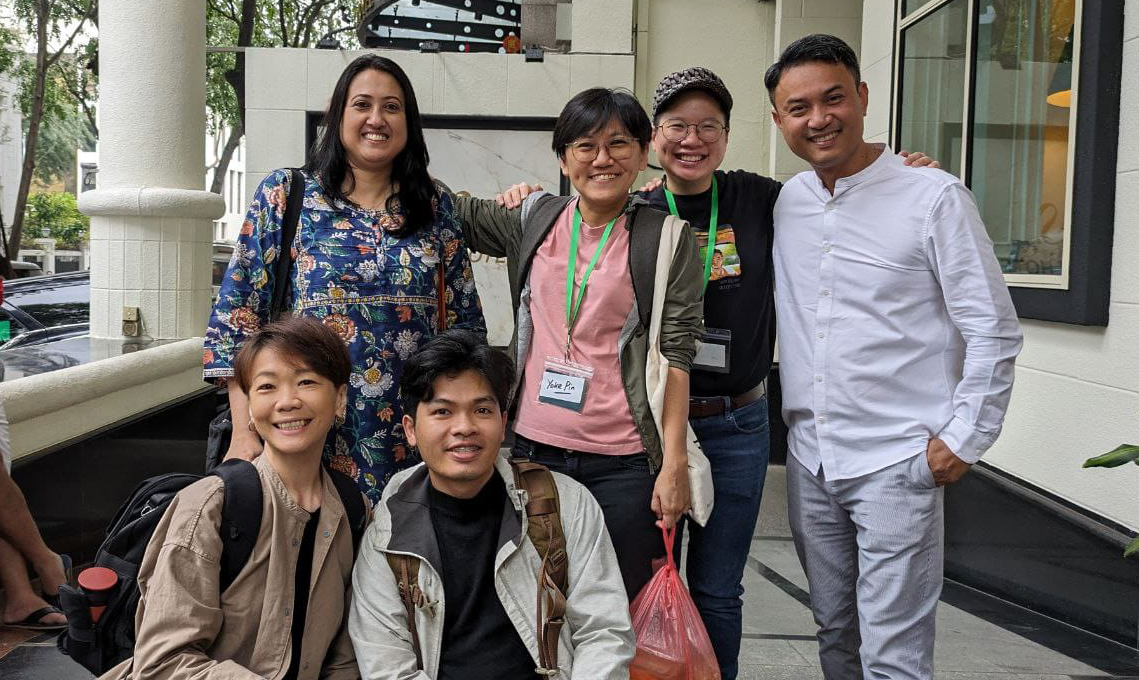
The article is a reflection by the author after attending Meeting Point 2024, organised by the Mekong Cultural Hub in Hanoi, Viet Nam. Despite the author being overwhelmed by the complex theme, “Life Cycles of Grassroots Arts Organisations in Asia,” he found a common thread exploring the dynamic between strong individual leadership in grassroots arts organisations and the collective needs of a community.
Through discussions with cultural practitioners PRIM Phloeun, CHEN Yoke Pin, and Po-Chieh CHEN, the article discusses the challenges and importance of negotiating leadership transitions while preserving core grassroots arts organisation values. Despite the complexity of the theme, there's a sense of optimism and camaraderie among the conference participants, emphasising the need for genuine connection and ongoing dialogue.
"How is your weather today?"

1. Screenshot of PRIM Phloeun showing the group via a video conference call, the art installation in front of Cambodian Living Arts. Photo © Mekong Cultural Hub
Outside the Cambodian Living Arts (CLA) office is an art installation by Cambodian contemporary artist Tan Vatey. It's a convex mirror with the question above asking, "How is your weather today?" Like the mirror, the question allows you a moment to reflect on your surroundings and either take caution or feel optimistic about the day ahead.
This question about the weather was recurring for the Meeting Point 2024 theme, "Life Cycles of Grassroots Arts Organisations in Asia." Organised by Mekong Cultural Hub (MCH), the curated conference allows participants to forecast the landscape of creative organisations in their own country and the region. Meeting Point is a series of talks, workshops, interactive sessions and presentations held every 18 months. Some of the presentations are sharing sessions for projects under MCH such as the local gatherings, and themes which are decided for each Meeting Point.
2. Photograph after their presentation during the Meeting Point 2024 in Hanoi. The group under the theme, "Life Cycles of grassroots arts organisations in Asia." also call themselves, ‘The Cool Cats.’ Photo © The group, "Life Cycles of Grassroots Arts Organisations in Asia."
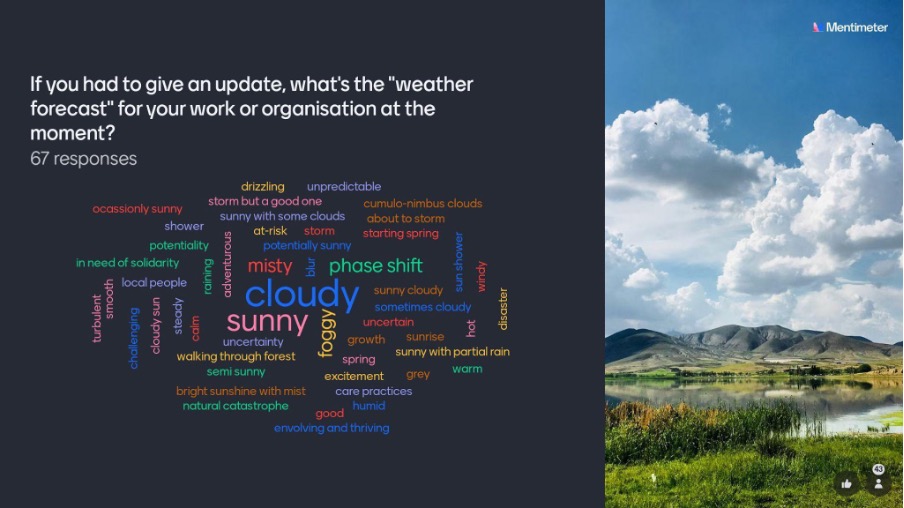
3. Results of the interactive survey during their presentation. Popular answers were cloudy, sunny and foggy. Photo © The group, "Life Cycles of Grassroots Arts Organisations in Asia."
The five selected participants, also called fellows, and the Executive Director of CLA, PRIM Phloeun, had monthly meetings. While their online monthly meetings started in July 2023 and were only scheduled for an hour, they ran for two or three hours. The programme gave participants space and breathing room to reflect. The fellows are diverse, with decades of experience as artistic directors, arts managers, community organisers, researchers, and experts in many other fields.
The participants were excited to share the findings of their eight-month inquiry with the audience at the 282 Workshop in Hanoi. For the fellows under the theme, they each shared their findings, with some audience interaction through an online survey. Hearing all the introductions and first learning of the theme, the scale of ambition was overwhelming for me as an observer. The fellows engaged with over 21 organisations through 14 interviews in 8 countries— Maa Kali Mat Industry near Kolkata in Midnapore, West Bengal is over 3400 km (2100 miles) apart from Ars Association in Taichung City!
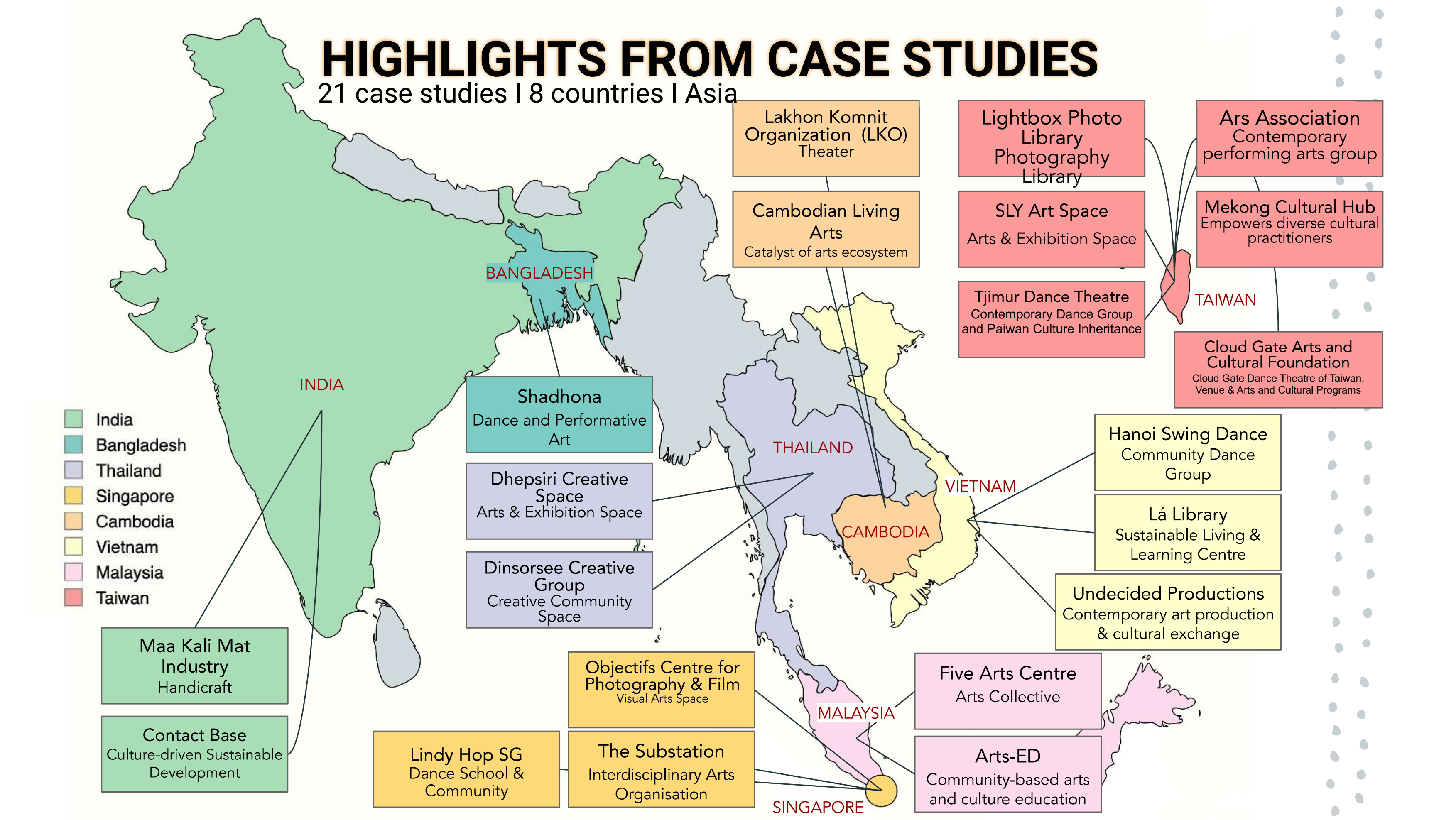
4. Highlights of the case studies showing the wide range of grassroots organisations interviewed, from dance schools, to arts collectives, visual arts spaces and exhibition spaces. Photo © The group. "Life Cycles of Grassroots Arts Organisations in Asia."
Their presentation wasn't rigorous academic research about grassroots organisations but rather a closer look at their close connections and networks. Their methodology covered key characteristics, such as resources, motivation, development, process, and growth. During the presentation, each fellow shared insights from their respective research areas and case studies. They drew from conversations with organisations in India, Bangladesh, and Taiwan and from Southeast Asia: Singapore, Cambodia, Viet Nam, and Malaysia.
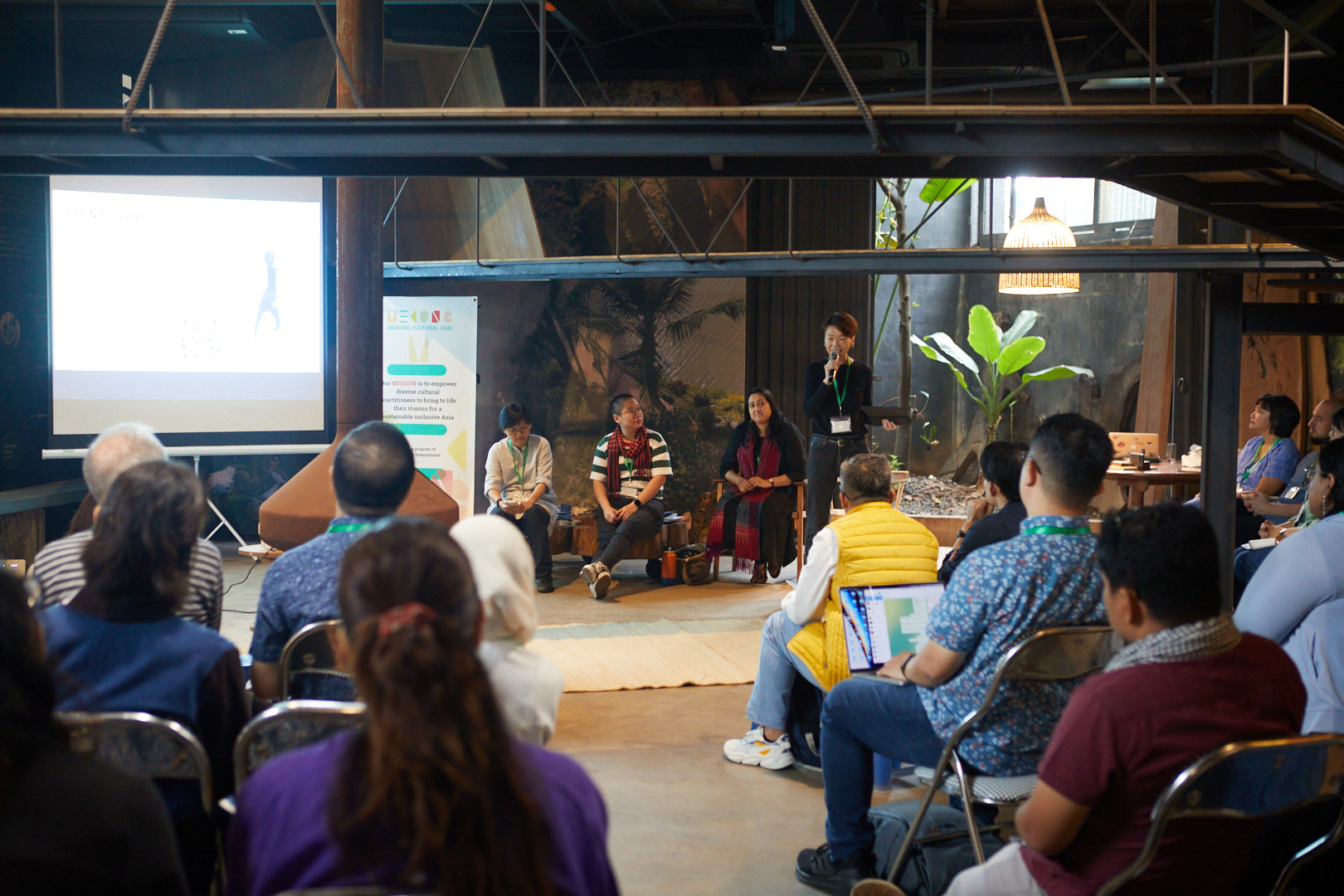
5. Curated conference presentation during the Meeting Point 2024. “Life Cycles of Grassroots Arts Organisations in Asia” was the first presentation of the first full day. Photo © Mr. Hoang Nguyen and Ms. Ngo Tran Phuong Uyen.
Grassroots arts organisations in transition
Given the breadth of the topic, it was difficult to find commonality between everyone's perspectives. However, I found the dynamics between strong individual leadership and collective organisation an interesting thread across case studies.
Their case studies across regions showed how individuals formed a close-knit circle to create an organisation. This is developed organically, with decision-making done democratically or through consensus. The strong leadership of the individual gives an arts organisation authority and trust in the community. As an organisation matures, there is a need for new leadership or fresh ideas to continue a legacy. This transition could signal a slow demise or the continual legacy of the organisation, as the values of the original founder or organising group are transmitted to a new generation.
After their presentations, I spoke to some fellows about their thoughts about strong leadership, as opposed to collective grassroots organisations. Phloeun leads the grassroots art organisation theme and has been with CLA for the past 15 years.
His suggestion of the theme to MCH grew out of his curiosity about how the life cycles of organisations in Asia differ from those in other parts of the world. He reflected on how their initial conversations within the group were far more rigid, focusing on existing rational models.
"I think we came up with a more organic, shared thematic way of looking at the life cycle," he shared. The conversations within the group revealed purpose-driven organisations, which spring from a founder with a vision and the community's collective needs. Phloeun feels a generational shift is happening: "Many organisations that have been 20, 30 years on the ground are now continuing with the younger generation of leaders, but their perspective is very different from that of the previous leadership."
CHEN Yoke Pin, a senior manager from Arts-ED, a non-profit organisation based in Penang, Malaysia, shared how negotiating is important during generational leadership transitions.
She was hesitant to draw a conclusion: "I think involving more people from the younger generation in the decision (making)—I think it's equally important—but also inheriting certain values that are built and founded by some of the leaders is also equally important."
Artistic director Po-Chieh CHEN of the Ars Association, a contemporary art duo located in Taichung, Taiwan, acknowledged the difficulty in transitioning to newer leadership and sharing the rupture that might occur between the generations.
"The organisation sometimes idolises or spiritualises the original founder. So when the second generation steps up, it's always challenging for the new leader to actually address their new goal and their new vision within the original organisation."
She also echoed the reluctance to reach a definite conclusion: "We don't have the exact answer, and all the leaders, or the newer generation, are still trying to find their way."
.jpg)
6. Meeting Point 2024. Photo © Mr. Hoang Nguyen and Ms. Ngo Tran Phuong Uyen.
Spoonfuls of RICE
Trying to understand the vast scope of the theme was like looking at the weather forecast but, not knowing all the symbols on the map, and feeling frustrated not knowing where to look. I left the Meeting Point 2024 presentation knowing how to predict the weather but not necessarily knowing all the symbols. I can tell you it's sunny, but I don't know how.
Overall, there were many points to grapple with, from creating dynamic spaces for emerging artists raised by Madhura DUTTA to organisational outreach for visibility explored by Olivia TAY. Each presentation segment brought up more points of consideration. Despite their experiences in the cultural field, pooling together the case studies drawn from hours of interviews, the fellows couldn't draw any authoritative conclusions. It wasn't through a lack of evidence or analysis!
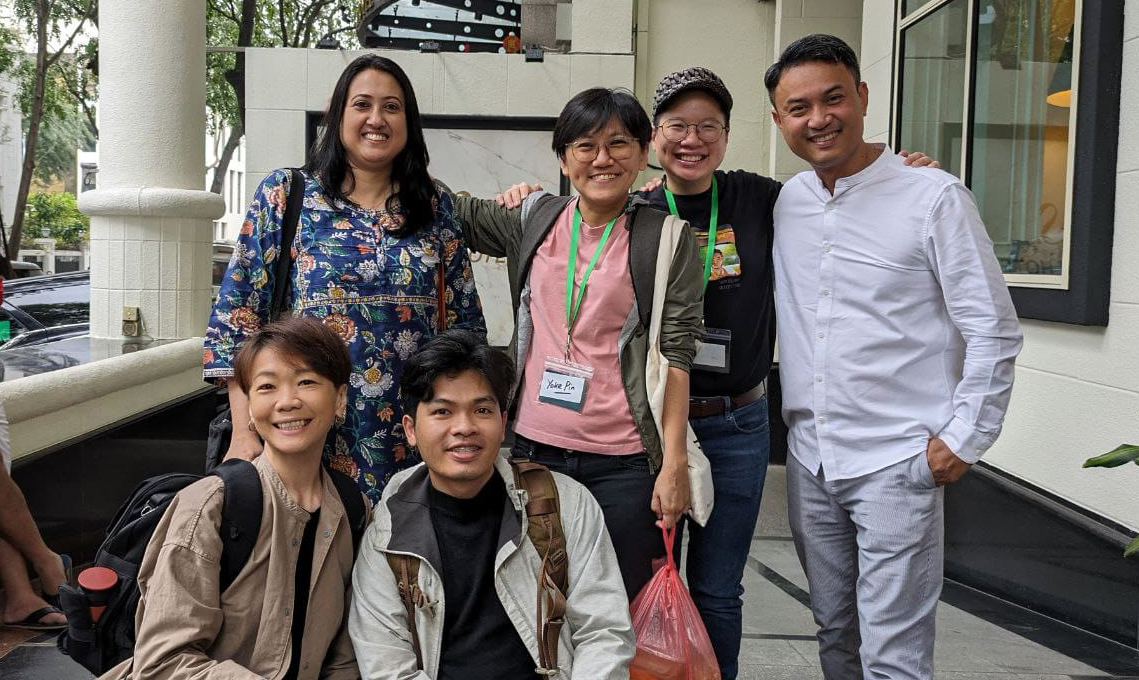
7. Hailing from different cultures and contexts, they all assembled in Hanoi for the meeting point. Fellows from India (Madhura DUTTA), Malaysia (CHEN Yoke Pin), Taiwan (Po-Chieh CHEN), Viet Nam (Xuan-Tung LE), and Singapore (Olivia TAY) led by a conference curator from Cambodia (PRIM Phloeun). Photo © The group, "Life Cycles of Grassroots Arts Organisations in Asia."
After their presentation, I am also left wondering what the fellows took from the months-long process despite their inconclusive analysis. Mostly, they felt encouraged by the insights gained and buoyed by the connections made. They reflected on how authentic it felt to connect—really connect.
Yoke Pin shared, "I felt that this sense of comradeship within only the six or seven people, I feel that it's being supported, and I think it can actually continue." Adding to this sentiment, Po-Chieh explained, "I think the most important thing is how we continue this connection and follow up with each other about what's going on, what's new, and what we want to talk about."
During the presentation, Xuan-Tung LE from Hanoi reflected on his own experience as a dance advocate with Swing Dancing Hanoi and as a writer. Drawing from both perspectives, he observed how grassroots arts organisations are like wild grass.
“Some wild grasses share the same system of roots, share resources, and rely on each other for survival,” Tung shared. Observing how, “I feel that the vitality of these organisations fascinated me. Even if they don’t have funding, they (still) do it and have a strong sense of goals.”
Phloeun also shared a hopeful note from the experience: "I think with all the challenges that we've looked at, there is still hope, and there is still inspiration that comes out of grassroots organisations."
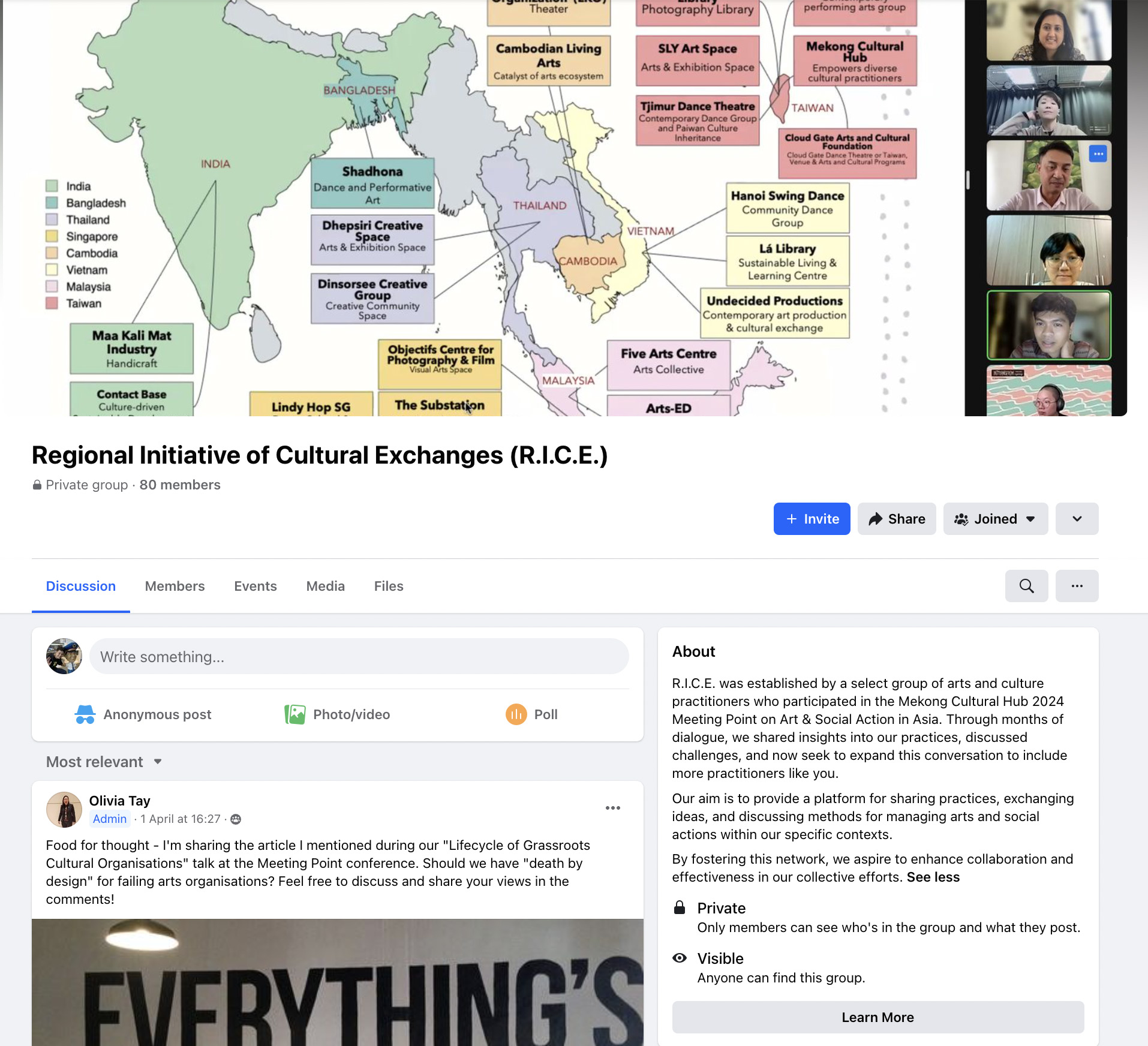
7. Screenshot of the Facebook group R.I.C.E (Regional Initiative of Cultural Exchange)
Their conversations continue in the Facebook group R.I.C.E (Regional Initiative of Cultural Exchange). They hope the Facebook group can be a place for sharing practices, exchanging ideas, and discussing methods for managing arts and social actions within specific contexts. You can follow the group here on Facebook: https://www.facebook.com/groups/379676318248676/.
While the disparate group of fellows was brought together by applying to the MCH programme, their conversations helped them develop a deeper connection with each other. In turn, this allows them to chart their course through the storms or rainy weather of the life cycle of grassroots arts organisations. For now, the weather is forecasted to be sunny.
Keen on finding out more about the fellow takeaways from their months-long programme? Watch the video below as Faiq speaks to Phloeun, Yoke Pin, and Po-Chieh as they share their findings:
Resources
- Cambodian Living Arts - https://www.cambodianlivingarts.org/en/
- Facebook group R.I.C.E (Regional Initiative of Cultural Exchange) - https://www.facebook.com/groups/379676318248676/
- The Substation - https://www.substation.org
- Sunny Side Up - https://sunny-side-up.blog/
- Ars Association - www.arsassociation.com
- Arts-ED (Community-based Arts and Culture Education) - https://www.arts-ed.my
- Artist researching: experience curves in Taiwan and Cambodia https://coverstory.ph/artist-researching-experience-curves-in-taiwan-and-cambodia/
- Meeting Point 2021: The cultural worker in a time of social change - https://artsequator.com/meeting-point-2021-cultural-worker/ 
About the Author
Faiq Airudin is a Brunei-based creative practitioner passionate about widening participation in Brunei's creative industry. His current collaborative project, 'Just Bruneians,' is a grassroots community project that aims to empower the creative industry through offline and online community engagement and mentorship. He is a creative producer, advisor and mentor to Brunei-based arts NGOs, galleries and production houses.
Similar content
deadline
26 Apr 2023
deadline
10 Sep 2023
07 May 2024
from - to
08 Mar 2024 - 24 Mar 2024
deadline
12 Nov 2023

